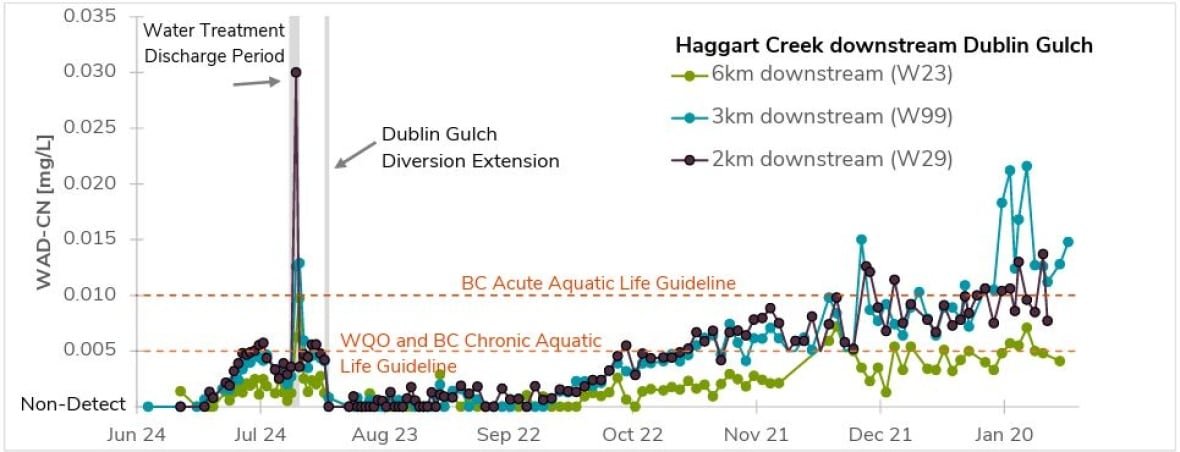The Yukon government says about 19 million litres of toxic water has escaped a containment pond at Eagle Gold mine which has been leaking since December, adding to ongoing contamination from June’s catastrophic heap leach failure.
At a technical briefing on Tuesday, Yukon government water resources scientist Tyler Williams told reporters that the water from the containment pond leak has likely reached Haggart Creek.
“The most recent [water monitoring] results indicate that the contaminated water that leaked from the containment pond is now impacting the creek,” he said. “There could be negative effects to the health of fish and other organisms.”
Since mid-January, Williams said, concentrations of cyanide in Haggart Creek have been well above what guidelines would consider an “acute” risk to aquatic wildlife. Levels of cobalt, nickel and chloride in the creek have also risen and are at unsafe levels, he said.

Haggart Creek has become the bellwether of environmental impacts since part of the mine — where cyanide is used to process ore — failed last June with a massive rockslide. Since then, contaminated water has been leaching into the environment.
The storage and treatment of contaminated water has been a serious issue since the mine failure happened, with hundreds of millions of litres of cyanide-contaminated water now being held in storage ponds at the site. It’s one of those storage ponds that is now leaking.
Fixing the leak will require emptying the 90-million-litre container completely of ice and water.
Erin Dowd, a technical services director for the territory, told reporters there is still no timeline for when the leak will be fixed, though she said it will be a “priority action” for the receiver, PricewaterhouseCoopers.
She said the receiver already has taken some steps to mitigate contamination from the leak, including increasing water monitoring and taking steps to start containment if leaked water leeches into groundwater.
Treatment plan releasing copper-contaminated water
Dowd also gave an update on efforts to treat the large stores of cyanide-contaminated water at Eagle mine.
The water treatment plant at Eagle mine uses copper to remove toxic cyanide from the water. Water that comes out of the treatment plant no longer has unsafe levels of cyanide, but it does have high levels of copper — which can itself be harmful to the environment.
Since last week, the receiver has been releasing about three million litres of copper-contaminated water into the environment every day.
Dowd said this is necessary because otherwise, there is a risk the coming spring melt will generate enough new cyanide-contaminated water to overwhelm the capacity of the storage ponds — potentially causing an “uncontrolled release” of cyanide-contaminated water.
She said technical advisors with both Yukon government and First Nation of Na-Cho Nyäk Dun are on board with this plan.
The water that has been released does not comply with the mine’s water license or federal regulations, Dowd said, but “is anticipated to pose low risk to aquatic life by the time it enters Haggart Creek.”
She said the receiver is currently building a settlement pond to remove copper from the treated water, but that treatment plant isn’t expected to be completed until the end of the month.
Once that settlement pond has been built, she said, treated water will be compliant with federal water quality stands.

